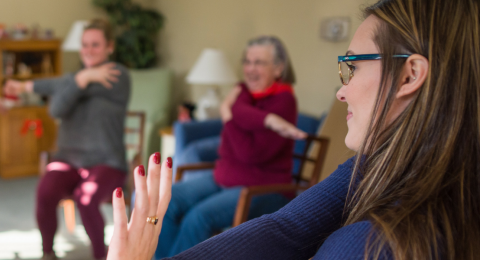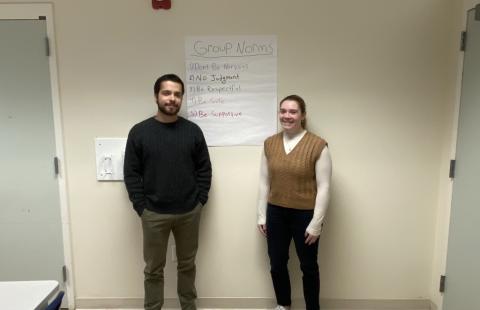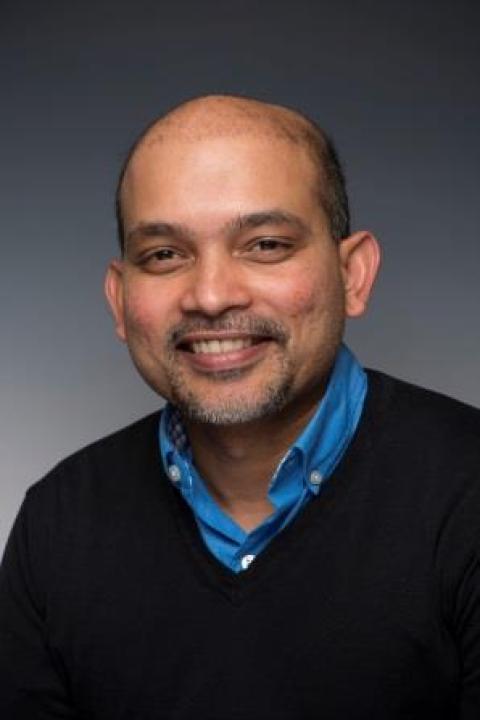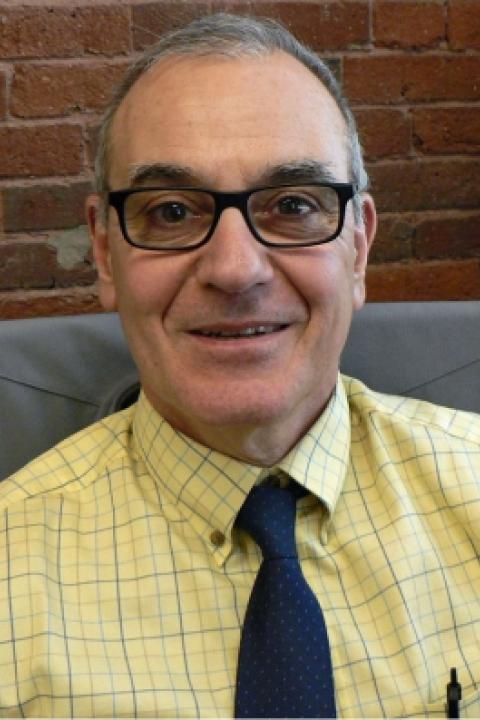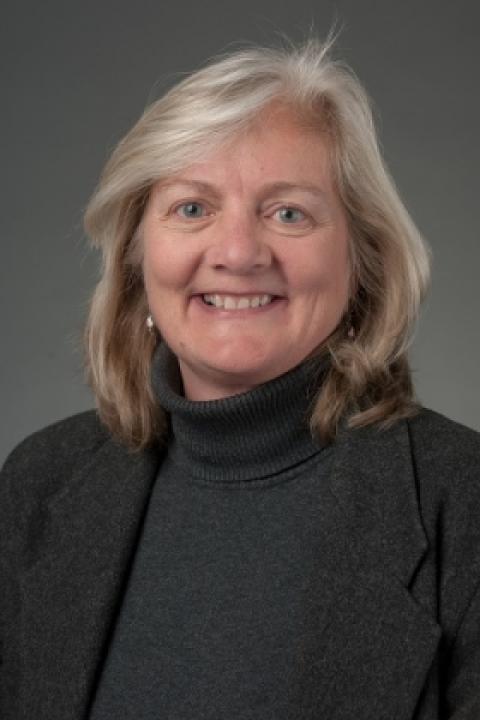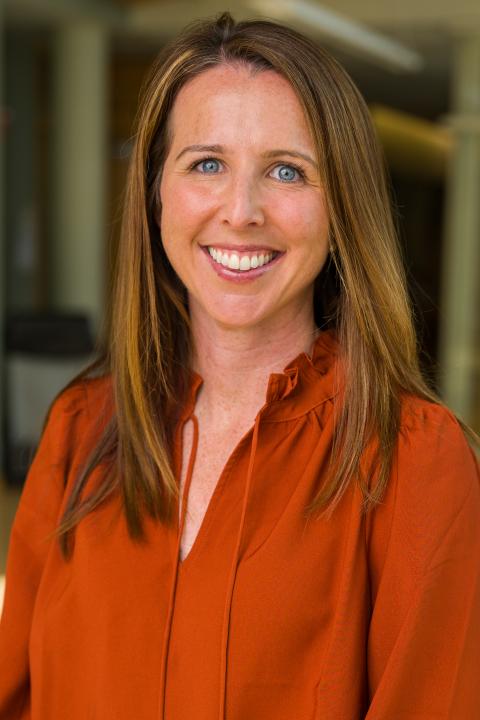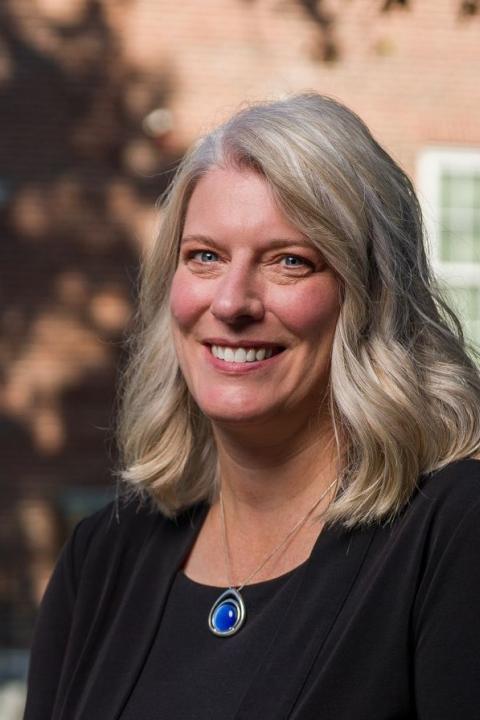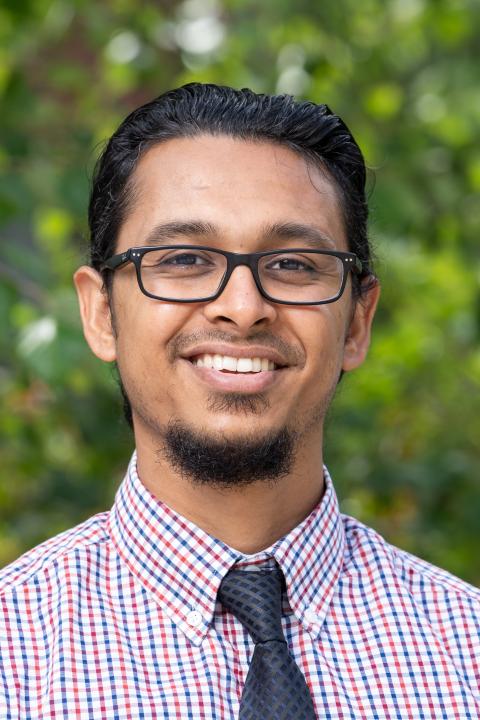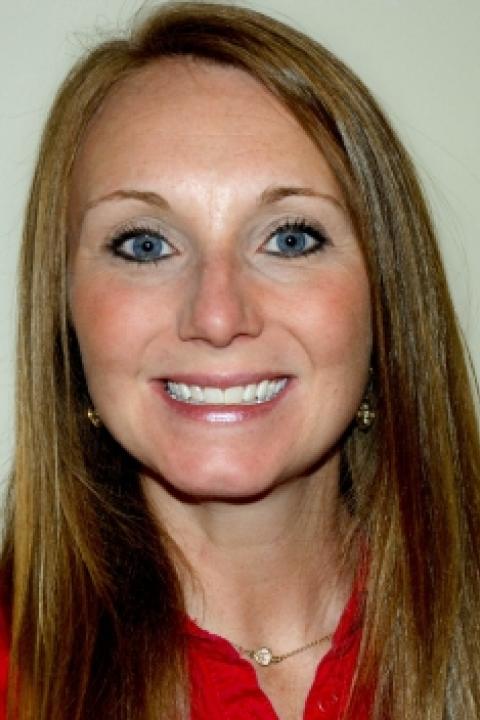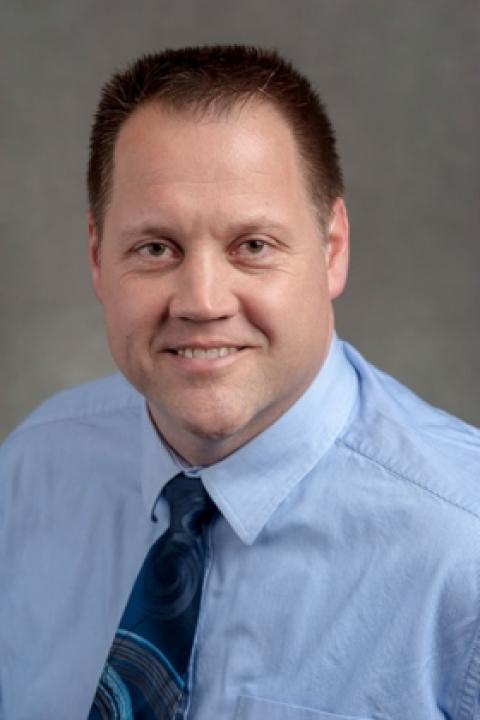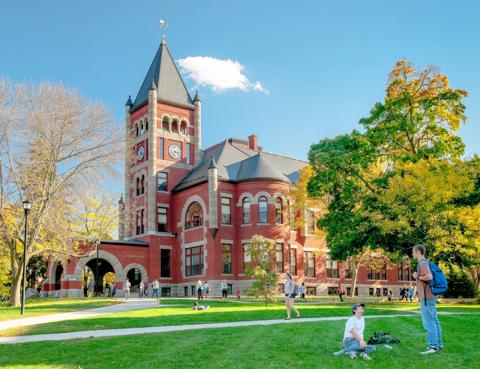The Occupational Therapy major at UNH prepares you to help individuals of all ages live life to the fullest, engaging in activities that are important and support life satisfaction. You'll learn to address physical, psychological, and social needs through hands-on learning and community-based services. UNH's combined B.S./graduate program allows for a seamless transition to either the MS or OTD program with advanced standing, decreasing a year of the graduate program.
WHAT IS OCCUPATIONAL THERAPY?
Occupational therapy enables people of all ages to live life to the fullest, supporting their participation in work, school, play or leisure, household tasks, self-care and community activities. Clients may be experiencing challenges due to an illness, injury or other condition. Occupational therapists use different strategies to address a person’s needs: promoting skills, adapting task demands and using assistive technology to support performance of desired activities. In the OT program at UNH, students learn to address the physical, psychological and social needs of clients, concentrating on what’s important to them to rebuild their health and well-being, independence and self-esteem.
WHY STUDY OCCUPATIONAL THERAPY AT UNH?
UNH prepares occupational therapists for the future of OT practice. The combined B.S./graduate program allows students to complete a bachelor’s degree and smoothly transition into an entry-level OT graduate program at the master’s degree level or a clinical doctoral program. Our program emphasizes hands-on learning opportunities with a focus on community-based services. Students intern in community programs, actively applying their knowledge and skills as part of their academic coursework. Students also have opportunities to work closely with faculty to engage in research and participate in program development. Challenging and rewarding fieldwork experiences prepare students for work in an array of settings. The Student Occupational Therapy Association (SOTA) provides additional educational, service and social opportunities for students.
EMPLOYMENT AREAS
- Hospitals
- Long-term care/skilled nursing facilities
- Public schools
- Rehabilitation facilities
From the CHHS Blog
Curriculum & Requirements
Bachelor of Science to Advanced MS/OTD Program
The University of New Hampshire Department of Occupational Therapy offers a Bachelor's Degree leading to entry with Advanced Standing into our MS or OTD program. Students in the Bachelor of Science (BS) program smoothly enter into one of the graduate programs by completing professional level OT courses as part of their BS degree. The BS and MS degree programs are completed in five and half years, while the BS and OTD programs require 6 years with two summer terms. Students declare their intent to graduate with an Advanced Standing MS or an Advanced Standing OTD at the end of their sophomore year. Students may enter the BS program as first-year students or apply to transfer within UNH into the BS program during the fall semester of their sophomore year, space permitting. Students interested in transferring into this program should contact the Department of Occupational Therapy for information about transfer requirements, the application process and deadlines.
Students' academic advisor guides them through a stream-lined application process to enter the Occupational Therapy: Advanced Standing MS or OTD Program during the senior year. Students must have a minimum of a 3.0 grade point average, earned a B- or above in all professional level OT courses (700 level or higher), with no more than 8 credits at B-, pass all competency (practical) exams as part of OT courses, pass level I fieldwork, and meet professional behavioral standards, which are detailed in the OT Department Policy and Procedure Manual, available to all OT students on the department's learning platform, MyCourses.
The Accreditation Council for Occupational Therapy Education (ACOTE), located at 7501 Wisconsin Ave. Suite 510E, Bethesda, MD 20814. Tel. 301- 652-6611, Website: www.acoteonline.org grants accreditation to entry level MS and OTD programs in the United States. Our Master’s degree program is currently accredited by ACOTE.
The OTD program at the University of New Hampshire has received candidacy for accreditation from the ACOTE. The program will have a pre-accreditation review, complete an onsite evaluation, and be granted Accreditation Status before its graduates will be eligible to sit for the National Certification examination.
After completing the Master's degree or OTD in occupational therapy, including 24 weeks of Level II Fieldwork, students will be eligible to sit for the national certification examination offered by the National Board for Certification in Occupational Therapy (NBCOT), which is required to practice as an occupational therapist. Detailed information regarding the Occupational Therapy: Advanced Standing MS and OTD Program may be found in the UNH Graduate Catalog. A felony conviction may affect a graduate's ability to sit for the NBCOT certification examination or attain state licensure.
Sample Degree Plan
This sample degree plan serves as a general guide; students collaborate with their academic advisor to develop a personalized degree plan to meet their academic goals and program requirements.
| First Year | ||
|---|---|---|
| Fall | Credits | |
| OT 510 | Exploring Occupational Therapy and Occupation | 4 |
| BMS 507 | Human Anatomy and Physiology I | 4 |
| ENGL 401 | First-Year Writing | 4 |
| Discovery or Inquiry Course | 4 | |
| Credits | 16 | |
| Spring | ||
| OT 500 | Behavior and Development of Children | 4 |
| PSYC 401 | Introduction to Psychology | 4 |
| BMS 508 | Human Anatomy and Physiology II | 4 |
| Discovery Course | 4 | |
| Credits | 16 | |
| Second Year | ||
| Fall | ||
| OT 501 | Developmental Tasks of Adulthood | 4 |
| OT 610 | Occupation, Identity, Disability | 4 |
| Health Policy course | 4 | |
| HMP 540 | Statistics for Health and Human Service Professionals | 4 |
| Credits | 16 | |
| Spring | ||
| KIN 652 | Clinical Kinesiology | 4 |
| OT 685 | Psychosocial Disorders and Everyday Life | 4 |
| Discovery Course | 4 | |
| Discovery Course | 4 | |
| Credits | 16 | |
| Third Year | ||
| Fall | ||
| KIN 706 & KIN 707 | Neurology and Neurology Lab | 6 |
| OT 620 | Medical Terminology | 2 |
| OT 710 | OT Practice and Professional Roles | 3 |
| OT 741 | Human Occupation | 4 |
| Credits | 15 | |
| Spring | ||
| OT 752 & 752L | Human Movement and Environmental Effects on Everyday Occupations and Human Movement Lab | 4 |
| OT 744 | Fieldwork and Professionalism - Level 1 | 1 |
| OT 792 | Level I Fieldwork | 1 |
| Discovery, Minor, or Elective Course | 4 | |
| Discovery, Minor, or Elective Course | 4 | |
| Discovery, Minor, or Elective Course | 4 | |
| Credits | 18 | |
| Fourth Year | ||
| Fall | ||
| OT 781 | Introduction to Research and Evidence-Based Practice | 3 |
| OT 751 | Mind Body Systems/Neurologically Based Function and Dysfunction | 4 |
| OT 760 & 760L & 760R | Psychosocial Evaluation and Intervention and Psychosocial Evaluation and Intervention Lab and Psychosocial Evaluation & Intervention Recitation | 4 |
| Discovery, Minor, or Elective Course | 4 | |
| Discovery, Minor, or Elective Course | 4 | |
| Credits | 19 | |
| Spring | ||
| OT 750 | Neuro-Occupation: The Relationship Between Occupation and the Brain (or elective) | 3 |
| OT 762 & 762L & 762R | Occupational Therapy Evaluation and Intervention for Children and Occupational Therapy Evaluation and Intervention for Children Lab and Occupational Therapy Evaluation and Intervention for Children Recitation | 4 |
| OT 763 & 763L & 763R | Occupational Therapy Evaluation and Intervention for Adults and Occupational Therapy Evaluation and Intervention for Adults Lab and Occupational Therapy Evaluation and Intervention for Adults Recitation | 4 |
| OT 782 | Research Methods and Application (Capstone) | 3 |
| Credits | 14 | |
| Total Credits | 130 | |
Degree Requirements
All Major, Option and Elective Requirements as indicated.
*Major GPA requirements as indicated.
Major Requirements
Students begin the BS curriculum with preprofessional courses, which include courses in biological and social sciences as well as occupational therapy. In addition to meeting the University Discovery Program requirements, students take the following courses during the first three years of the program.
| Code | Title | Credits |
|---|---|---|
| Core Curriculum | ||
| BMS 507 | Human Anatomy and Physiology I | 4 |
| BMS 508 | Human Anatomy and Physiology II | 4 |
| OT 500 | Behavior and Development of Children | 4 |
| OT 501 | Developmental Tasks of Adulthood | 4 |
| OT 510 | Exploring Occupational Therapy and Occupation | 4 |
| OT 610 | Occupation, Identity, Disability 1 | 4 |
| OT 620 | Medical Terminology | 2 |
| OT 685 | Psychosocial Disorders and Everyday Life | 4 |
| KIN 652 | Clinical Kinesiology | 4 |
| KIN 706 & KIN 707 | Neurology and Neurology Lab | 6 |
| PSYC 401 | Introduction to Psychology | 4 |
| Select one statistics course from the following: | 4 | |
PSYC 402 | Statistics in Psychology | |
HMP 540 | Statistics for Health and Human Service Professionals | |
SOC 402 | Statistics | |
| Select one health or social policy course from the following: | 4 | |
HDFS 760 | Family Programs and Policies | |
HDFS 776 | Children, Adolescents and the Law | |
HDFS 794 | Families and the Law | |
HMP 401 | United States Health Care Systems | |
HMP 403 | Introduction to Public Health | |
HMP 744 | Law and Ethics in Healthcare | |
HMP 746 | Health Policy | |
POLT 500 | American Public Policy | |
RMP 663 | Management and Finance in the Experience Industry | |
SW 525 | Social Welfare Policy: History of Social and Economic Justice | |
SW 705 | Child and Adolescent Risks and Resiliency: Program, Policy and Practice | |
Details on satisfying these requirements are provided by the student's academic adviser and are outlined in the OT Department Policy and Procedure Manual. All students receive an electronic copy of the manual in their first year, and it is also available on the Occupational Therapy Student Resources site on the University learning platform.
Volunteer or work experience in a health and human service organization is recommended, although not required.
Professional Curriculum
Students with a GPA of 3.0 or higher who will apply to enter the Advanced Standing MS or Advanced Standing OTD programs take the following professional level courses during their undergraduate education.
| Code | Title | Credits |
|---|---|---|
| Required Courses BS-MS and BS-OTD | ||
| OT 710 | OT Practice and Professional Roles | 3 |
| OT 741 | Human Occupation 1 | 4 |
| OT 744 | Fieldwork and Professionalism - Level 1 | 1 |
| OT 751 | Mind Body Systems/Neurologically Based Function and Dysfunction | 4 |
| OT 752 & 752L | Human Movement and Environmental Effects on Everyday Occupations and Human Movement Lab | 4 |
| OT 763 & 763L & 763R | Occupational Therapy Evaluation and Intervention for Adults and Occupational Therapy Evaluation and Intervention for Adults Lab and Occupational Therapy Evaluation and Intervention for Adults Recitation | 4 |
| OT 781 | Introduction to Research and Evidence-Based Practice | 3 |
| OT 782 | Research Methods and Application (Capstone) | 3 |
| OT 792 | Level I Fieldwork | 1 |
| OT 760 & 760L & 760R | Psychosocial Evaluation and Intervention and Psychosocial Evaluation and Intervention Lab and Psychosocial Evaluation & Intervention Recitation | 4 |
| OT 762 & 762L & 762R | Occupational Therapy Evaluation and Intervention for Children and Occupational Therapy Evaluation and Intervention for Children Lab and Occupational Therapy Evaluation and Intervention for Children Recitation | 4 |
- 1
This course also fulfills the writing intensive in major course.
Students need to declare their choice for Advanced Standing MS or OTD by the end of their sophomore year. At the end of the senior year, students are awarded a Bachelor of Science Degree in Occupational Therapy. However, students must earn a graduate degree (MS or OTD) to become registered occupational therapists. Students apply to the Graduate School for Occupational Therapy: Advanced Standing MS or the OTD Program during their senior year. An overall minimum grade point of 3.0 is required for admission to the MS Program or OTD program, and students must earn a minimum grade of B- in all OT classes at the 700 level, with no more than 8 credits of B- in OT courses at the 700 level, pass Level I Fieldwork, and meet professional behavior expectations. Please refer to the Graduate Catalog for additional information about the Advanced Standing MS and OTD Programs and the graduate portion of the professional occupational therapy curriculum including Fieldwork Level II requirements.
Students are responsible for transportation to off-campus practicum and fieldwork locations.
Curriculum review and revision is undertaken annually. The department works closely with students during academic advising sessions and shares information about any policy and requirement changes during registration periods as well as throughout the academic year. Students also are expected to take an active role in verifying expectations and should check with their academic adviser each September for updated policies and requirements. Program requirements and policies for retention in the major are in the OT Department Policy and Procedure Manual, which is available online.
Program Learning Outcomes
The BS in Occupational Therapy focuses on the study of human participation in life occupations and prepares students for an entry-level graduate degree to become registered occupational therapists. Occupations are the activities that people do every day, including but not limited to self-care, education, employment, volunteer work, household activities, leisure, and play. The aim of the BS program is to prepare students for graduate study in occupational therapy. Students with a BS degree may also seek employment in health services fields or other varied health and service fields.
Upon graduation with a BS in OT degree from UNH, students will:
- Critically evaluate biological, psychosocial, and educational theories that influence human behavior and occupational participation.
- Demonstrate an understanding of the value of human occupation in health and wellness.
- Demonstrate critical appraisal of how disease and disability influences health promotion and occupational well-being.
- Recognize the role of culture, socioeconomic status, abilities, and other factors on occupational performance and participation of all members of society.
- Demonstrate an understanding of concepts of occupational deprivation and occupational justice as related to health and well-being for all people.
- Demonstrate competency in information and basic research literacy.
- Demonstrate professional behaviors and skills in written and oral communication.
- Be prepared to apply for graduate study in the field of occupational therapy or other disciplinary area of graduate study.
Professional Licensure/Certification Disclosures
This program is not designed to lead to professional licensure or certification.
Visit the Office of the Registrar's website for more information about university programs that lead to professional licensure or certification.
Explore Program Details
Students interested in our Occupational Therapy major may also be interested in these advanced degree offerings:
